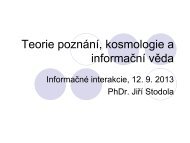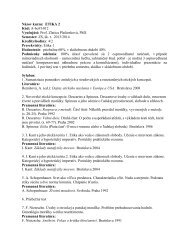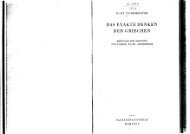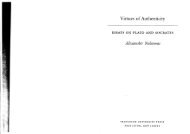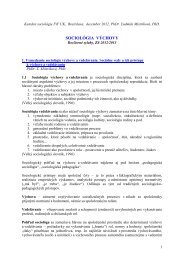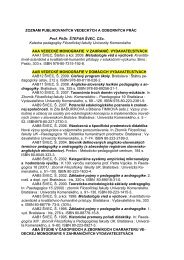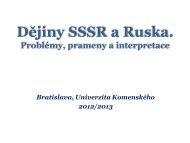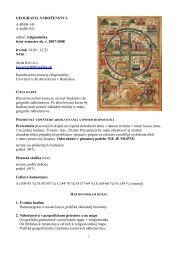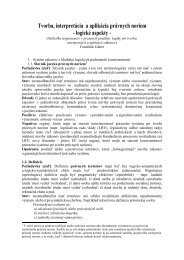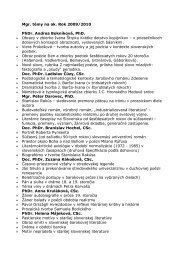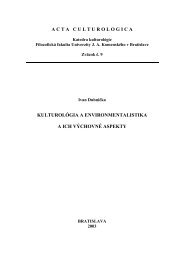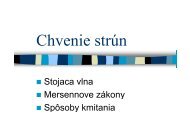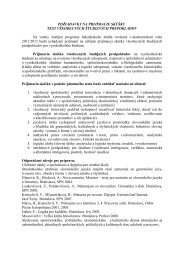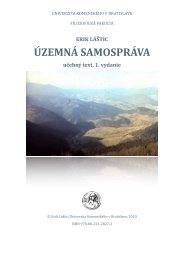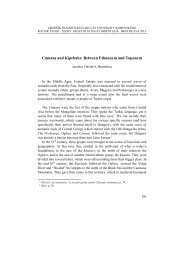Department of British and American Studies at the - Univerzita ...
Department of British and American Studies at the - Univerzita ...
Department of British and American Studies at the - Univerzita ...
Create successful ePaper yourself
Turn your PDF publications into a flip-book with our unique Google optimized e-Paper software.
for I am <strong>of</strong> Slavic parentage<br />
<strong>and</strong> a Buddhist Jew<br />
Who worships <strong>the</strong> Sacred Heart <strong>of</strong> Christ<br />
<strong>the</strong> blue body <strong>of</strong> Krishna<br />
<strong>the</strong> straight back <strong>of</strong> Ram<br />
<strong>the</strong> beads <strong>of</strong> Chango <strong>the</strong> Nigerian singing<br />
Shiva Shiva in a manner which<br />
I have invented,<br />
<strong>and</strong> <strong>the</strong> King <strong>of</strong> May is a middle-european<br />
honor, mine in <strong>the</strong> XX century<br />
despite space ships <strong>and</strong> <strong>the</strong> Time Machine,<br />
because I heard <strong>the</strong> voice <strong>of</strong><br />
Blake in a vision <strong>and</strong><br />
repe<strong>at</strong> th<strong>at</strong> voice. (Ginsberg 1997: 148)<br />
During <strong>the</strong> visit to Prague, <strong>and</strong> o<strong>the</strong>r places in <strong>the</strong> Soviet bloc, including Moscow<br />
where he met with <strong>the</strong> poets Yevtushenko <strong>and</strong> Voznesensky, Ginsberg must have gotten a<br />
taste <strong>of</strong> both <strong>the</strong> total lack <strong>of</strong> freedom <strong>and</strong> <strong>the</strong> suppressed but stored-up desire to be free. The<br />
short visit to Czechoslovakia was a memorable event, indeed a powerful political happening.<br />
It was understood as such by everybody involved, from <strong>the</strong> enthusiastic students to <strong>the</strong><br />
irrit<strong>at</strong>ed regime, <strong>and</strong> <strong>the</strong> poet himself. Ginsberg‘s visit <strong>and</strong> eviction were remembered for<br />
years as a symbolic moment <strong>of</strong> resistance, especially among young people <strong>and</strong> above all<br />
among students, despite <strong>the</strong> fact th<strong>at</strong> hardly anyone knew his poetry, which could only<br />
circul<strong>at</strong>e as samizd<strong>at</strong> m<strong>at</strong>erial, if it was <strong>at</strong> all available or transl<strong>at</strong>ed. When asked about <strong>the</strong><br />
impact <strong>of</strong> Ginsberg <strong>and</strong> o<strong>the</strong>rs in Czechoslovakia, Václav Havel wrote in 1999: ―There has<br />
been a sensitive awareness <strong>of</strong> <strong>the</strong> Be<strong>at</strong> movement in our country since <strong>the</strong> nineteen fifties. The<br />
general revolt against <strong>the</strong> <strong>of</strong>ficial establishment <strong>and</strong> <strong>the</strong> literary nonconformism <strong>of</strong> <strong>the</strong> Be<strong>at</strong><br />
poetry <strong>and</strong> prose have most likely been perceived in our unfree conditions as even more<br />
rebellious than in <strong>the</strong> l<strong>and</strong> <strong>of</strong> <strong>the</strong>ir origin‖ (Havel 2001: ix). The fact th<strong>at</strong> Ginsberg was also<br />
remembered as one <strong>of</strong> <strong>the</strong> close <strong>and</strong> familiar figures <strong>of</strong> world liter<strong>at</strong>ure from <strong>the</strong> outside <strong>of</strong> <strong>the</strong><br />
Iron Curtain was confirmed when he was welcomed in Prague after <strong>the</strong> November revolution<br />
<strong>of</strong> 1989. Already in May 1990 we had him back, an elderly man but still full <strong>of</strong> life <strong>and</strong><br />
visibly happy th<strong>at</strong> he was able to celebr<strong>at</strong>e with us <strong>the</strong> return <strong>of</strong> freedom <strong>and</strong> democracy. And<br />
so <strong>the</strong> Czechoslovak episode from 1965 remained a surprisingly strong memory not just for us<br />
here but for <strong>the</strong> poet himself, as I found out when interviewing him. It took away some <strong>of</strong> his<br />
Slovak <strong>Studies</strong> in English, Vol. 3, 2011 – Identity in Intercultural Communic<strong>at</strong>ion<br />
29



